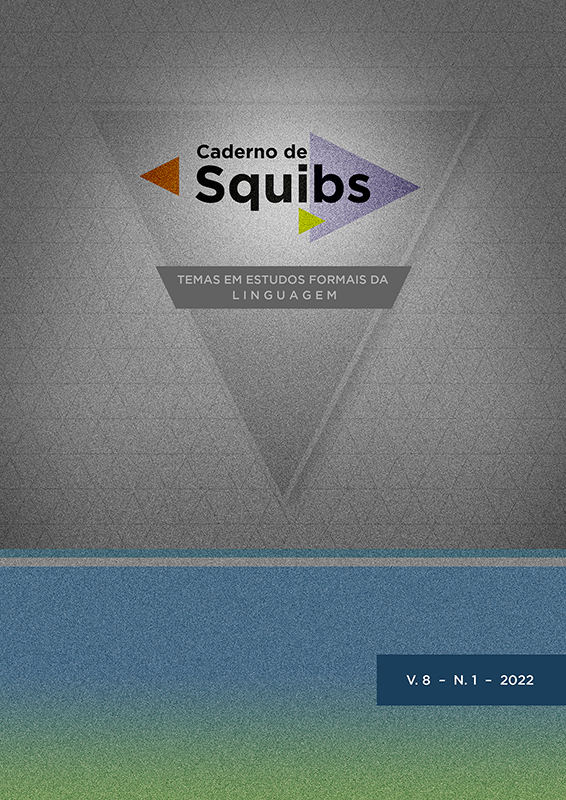Flavors of intensity and emphasis: the case of muito in Brazilian Portuguese
Conteúdo do artigo principal
Resumo
This paper focuses on an emphatic use of the prototypical intensifier muito in Brazilian Portuguese (BP). Despite its use as an intensifier as in muito alto ‘very high’, muito has been recently used associated to emphasis as in muito golpe ‘really a coup’. The analysis proposed in this paper adopts a scalar semantics framework (cf. Kennedy (1999), Kennedy and McNally (2005), a.o.) and invests in a unified lexical entry that is adequate to capture both intensive and emphatic uses. The formal proposal is based on a semantic step that shifts the type of nouns such as golpe from <e,t> to <d,<e,t>> and provides them a scale of precision (based on Morzycki (2011)). The descriptive meaning of emphatic phrase is that the noun is interpreted in its maximum precision. On the pragmatic level, the analysis considers muito as a mixed intensifier that presents an expressive counterpart that manifests an emotional effect captured by a use-conditional based approach (cf. Gutzmann (2019)). The discussion adds facts and arguments to a body of publication on intensifiers in BP (cf. Guimarães (2007), Quadros Gomes (2011), Quadros Gomes and Sanchez-Mendes (2015), Quadros Gomes (2018), Pires de Oliveira and Souza (2018), Quadros Gomes et al. (2021)).
Downloads
Detalhes do artigo

Este trabalho está licenciado sob uma licença Creative Commons Attribution-NonCommercial 4.0 International License.
Autorizo a publicação de squib/artigo de minha autoria e inteira responsabilidade para publicação.
I authorize the publication of the squib/paper of my authorship and full responsibility for publication.
Referências
BELTRAMA, A. Totally between subjectivity and discourse: Exploring the pragmatic side of intensification. Journal of Semantics, v. 35, p. 219-261, 2018.
BELTRAMA, A.; BOCHNAK, M. R. Intensification without degrees cross-linguistically. Natural Language & Linguistic Theory, v. 33, p. 843-879, 2015.
BELTRAMA, A.; TROTZKE, A. Conveying emphasis for intensity: Lexical and syntactic strategies. Language and Linguistics Compass, v. 13, n. 7, p. 1-13, 2019.
BURNETT, H. A delineation solution to the puzzles of absolute adjectives. Linguistics and Philosophy, v. 37, p. 1-39, 2014.
BURNETT, H. Comparison Across Domains in Delineation Semantics. Journal of Logic, Language and Information, v. 24, p. 233-265, 2015.
BYLININA, E. This is so NP! Baltic International Yearbook of Cognition, Logic and Communication, v. 6, n. 1, p. 1-29, 2011.
CAUDAL, P.; NICOLAS, D. Types of degrees and types of event structures. In: MAIENBORN, C.; WÖLLSTEIN, A. Event Arguments: Foundations and Applications. Mounton: Degruyter, 2005. p. 277-300.
DOETJES, J. Adjectives and degree modification. In: MACNALLY, L.; KENNEDY, C. (ed.). Adjectives and adverbs: syntax, semantics and discourse. Oxford: Oxford University press, 2008. p. 123-155.
GUIMARÃES, M. R. Dos intensificadores como qualificadores: os âmbitos de expressão da quantificação no português do Brasil. 2007. PhD dissertation – Universidade Federal do Paraná, Curitiba, 2007.
GUTZMANN, D. The Grammar of expressivity. Oxford: Oxford University Press, 2019.
HEIM, I.; KRATZER, A. Semantics in generative grammar. Oxford: Blackwell Publishers, 1998.
IRWIN, P. So [totally] speaker-oriented: An analysis of “Drama SO”. In: ZANUTTINI, R.; HORN, L. R. (ed.). Microsyntactic Variation in North American English. Oxford: Oxford University Class, 2014. p. 29-70.
KENNEDY, C. Projecting the adjective: The syntax and semantics of gradability and comparison. NewYork: Garland, 1999.
KENNEDY, C. Vagueness and grammar: The semantics of relative and absolute gradable adjectives. Linguistics and Philosophy, v. 30, p. 1-45, 2007.
KENNEDY, C.; MCNALLY, L. Scale structure, degree modification and the semantics of gradable predicates. Language, v. 81, p. 345-381, 2005.
KLEIN, E. A semantics for positive and comparative adjectives. Linguistics and Philosophy, v. 4, p. 1-45, 1980.
MCNALLY, L. Modification. In: ALONI, M; DEKKER, P. (ed.). Cambridge Handbook of Formal Semantics. Cambridge: Cambridge University Press, 2016. p. 442-466.
MCNALLY, L.; KENNEDY, C. Introduction. In: MCNALLY, L.; KENNEDY, C. (ed.). Adjectives and Adverbs: Syntax, Semantics and Discourse. Oxford: Oxford University Class, 2008. p. 1-15.
MORZYCKI, M. Metalinguistic comparison in an alternative semantics for imprecision. Natural Language Semantics, v. 19, n. 1, p. 39-86, 2011.
PIRES DE OLIVEIRA, R.; SOUZA, L. M. Um rascunho para a semântica de muito: explorando a Semântica de Delineação. Cadernos de Estudos Linguísticos, v. 60, p. 222-241, 2018.
QUADROS GOMES, A. P. Restrições aspectuais à distribuição do advérbio baixo ‘muito’. Cadernos de Estudos Linguísticos, v. 60, p. 198-221, 2018.
QUADROS GOMES, A. P. Uma proposta de distinção semântica para os intensificadores ‘muito’ e ‘bem’. Estudos Linguísticos, v. 40, p. 379-394, 2011.
QUADROS GOMES, A. P.; DELDUQUE, J. S. Um estudo sobre o licenciamento e a interpretação de 'pouco’ em português do Brasil (PB). Revista de Estudos da Linguagem, v. 27, p. 1489-1530, 2019.
QUADROS GOMES, A. P.; NASCIMENTO, A. C.; MEDEIROS, B. S. Estrutura escalar em classes acionais. Diacrítica, v. 35, p. 78-103, 2021.
QUADROS GOMES, A. P.; SANCHEZ-MENDES, L. Degree modification in Brazilian Portuguese and in Karitiana. Revista Virtual de Estudos da Linguagem, v. 13, p. 5-32, 2015.
RAINER, F. L’intensificazione di aggettivi mediante -issimo. In: MAURIZIO, D.; DRESSLER, W.; HELD, G. (ed.). Akten des 2. Österreichischitalienischen Linguistentreffens. Tübingen: Narr, 1983. p. 94-102.
ROMERO, M.; HAN, C. On negative yes/no questions. Linguistics and Philosophy, v. 27, n. 5, p. 609-658, 2004.
SANCHEZ-MENDES, L. Degree Modification in Karitiana: Evidence for Scalar Properties of Gradable Predicates. In: PASQUEREAU, J. C. (ed.). SULA 8: Proceedings of the Eighth Meeting of the Semantics of Under-Represented Languages in the Americas. Amherst: GLSA Publications, 2015. p. 53-72.
